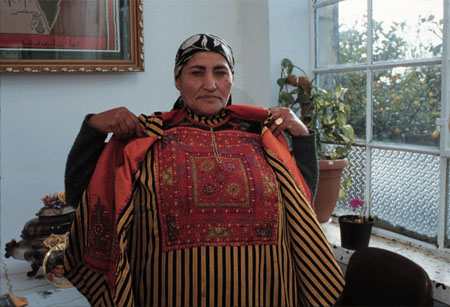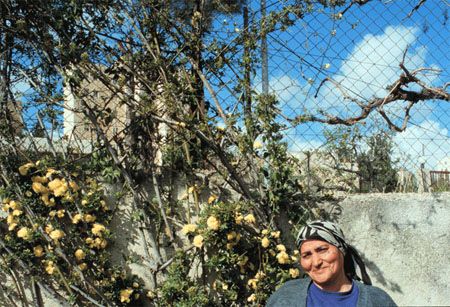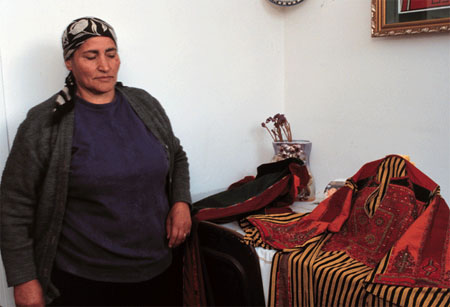
Sarah Odeh in her house, showing her embroidered dress. 1999
Photo: Leena Saraste
|
 Sarah Odeh in her house, showing her embroidered dress. 1999 Photo: Leena Saraste |
Sara Odeh, Sheikh Jarrah, East Jerusalem, April 1:
|
 Sarah Odeh outside with her yellow roses. 1999 Photo: Leena Saraste |
|
This visit brings us back close to Hajji Aysha and the Hebrew University, where refugees from Lifta village built on land they owned, and where they remained unmolested until Israel occupied the whole of Jerusalem in the 'Six Day' war. Sara lives alone in a one-floor stone house, rebuilt after being dynamited in 1970. This is a story about a house and a woman -- Sarah's mother who died last year. Sara's father died soon after the Nakbeh, in 1952, leaving her mother to bring up eight young children. Aged 10 in 1948, Sara was the oldest daughter, so much of the upbringing of her brothers fell on her. Between 1967 and 1969, two of the brothers were arrested and imprisoned. Sara's mother used to go daily to the main interrogation center, the Moscobiyya, to ask about them. It was during one of these visits that she got news that the Israeli army had surrounded the home. They were given 15 minutes to remove their belongings before the house was blown up. Then comes the most remarkable part -- Sara's mother pitched a makeshift 'tent' on her land, and insisted on staying with her young children. Then, stone by stone, she rebuilt her home. Of course the neighbours helped, also the children after school. But essentially it was her work, so onerous that her health was permanently affected. Other tragedies befall her but she remains firm in her faith in God and in the 'watan' (homeland), an unforgettable model to her children.
I learn a lesson from this session with Sara. She finishes her 'life story' and the recording session seems to be finished. I almost commit the sin of accepting as 'natural' that she has talked only about her mother, her brothers, the house, not at all about herself. Without really expecting anything 'out of the ordinary' I re-open the tape recorder and ask Sara to speak about herself. A rich individual narrative emerges, one that was buried under the culturally more valued, more familiar family story. This teaches me that I've lived so long in the Arab world that I'm in danger of conforming to cultural 'rules' too easily. In spite of my explicit |
aim of recording women's stories, I'm in danger of not making enough effort to overcome women's reticence about themselves.
After the recording, Leena photographs Sara with some of her embroidery work, and in her garden where jasmine is already blooming. A tall, straight-backed woman, she has striking green-grey eyes. Sarah Odeh speaks:"I am Sarah Ahmad Odeh. In 1948 I was about ten years old, and I remember how we left Lifta. In Lifta --- the Jewish gangs began to attack the villages near Jerusalem, among them Lifta. They attacked us once, then a second time, but we didn't want to leave. Our home faced the Jaffa road, and all the firing was on it. So we left our house for a lower house, a little bit far from the Jews, and still the shooting followed us. My mother was frightened for my brothers. She said to my father, 'Let's take them to a village near us so we shall be a little far from the Jews'. He said, 'No, it's impossible that I should leave my village. This is my village and my land. How can we leave?' She said, 'We won't take anything with us. Just the children. We'll take them away for a week until the shooting stops' -- because all my brothers, all of us were young, and we were screaming. My father used to come and go through all the shooting, and he got wounded in his legs. He crawled on his hands and feet until he reached the house. He took us to another house. And still the shooting continued, night and day. Then they started to send shells, because our village, the old one, was on the road to Jaffa, and they took the Jaffa road and one side of Deir Yassin. They began to hit us with shells. And anyone who went out of his house, they aimed at him and shot him. At that time they hit a Lifta coffee house and many people were killed. People were maddened by the noise... so my mother convinced my father that we should leave for a week...my father didn't allow her even to take bread..." |
 Sarah Odeh in her house. 1999 Photo: Leena Saraste |
[Na'ila Zaru'] [Fatima Qara'in, Silwan] Copyright©2005 |
|